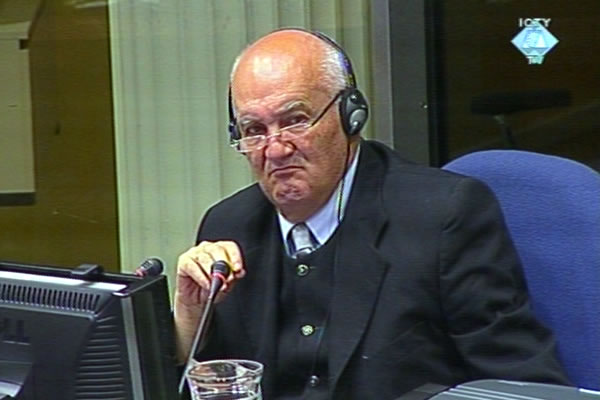Home
SERBIAN INTELLIGENCE OFFICER CALLED AS FIRST WITNESS OF GOTOVINA'S DEFENSE
Slobodan Lazarevic, former JNA counter-intelligence officer who testified as prosecution witness against Milosevic, is testifying at Operation Storm trial, confirming Ante Gotovina’s defense case: ‘fear of Croats’ was fomented among Krajina Serbs, there were no civilians among Krajina men, and the Serbian leadership ‘supported’ the Krajina exodus
 Slobodan Lazarević, svjedok odbrane Ante Gotovine
Slobodan Lazarević, svjedok odbrane Ante Gotovine The first defense witness called by Croatian general Ante Gotovina is a Serb officer who served in the former JNA Counter Intelligence Service (KOS). Slobodan Lazarevic served for almost four years, from February 1992 to August 1995, as chief intelligence officer with the 21st Corps in the Krajina Serb army. In 2002, Lazarevic gave evidence at the trial of Slobodan Milosevic about the ties between the Serbian political, military and police leadership and the events in the so-called Republic of Serbian Krajina. Today Gotovina’s defense tendered into evidence the transcript of Lazarevic’s testimony at that trial and his statement to the OTP investigators in 1999.
Lazarevic today confirmed some key arguments of General Gotovina’s defense. Gotovina is charged with murder and persecution of Serbs in Krajina and with looting and destruction of their property during and after Operation Storm in August 1995. He is on trial with Ivan Cermak and Mladen Markac. According to the witness, maintaining the atmosphere of fear of Croats and military tension among the local population was ‘an essential element for the survival’ of the RSK. To that aim, the leadership in Knin fomented the belief that Serbs and Croats could not live together; those who disagreed were seen as enemies of the regime, such as for instance Dmitar Obradovic, the mayor of the town of Vrgin Most, who was killed for advocating coexistence with Croats, Lazarevic said.
It was easier to create the climate of fear, Lazarevic added, because of some actions launched by the Croatian Army, such as the attack on Serbian hamlets in the Medak pocket in 1993; the fact that from 1991 to 1995 many crimes were committed against Krajina Croats helped further, because it was easy to convince people that retaliation would follow. Lazarevic thus corroborated the defense argument that there were prerequisites for the population to flee Krajina in sheer fear, even before the arrival of the HV in August 1995.
Lazarevic further bolstered the defense by saying that there had been no male civilians in the RSK. Men of military age, the witness said, were called up and among volunteers there were boys as young as 16 and 75-year-old men. Even if they were dressed in jeans and shirts, the witness contends, that didn’t mean they were civilians because they were armed and part of the army or the police. None of them, the witness went on, could claim that ‘they were not involved’ in military activities: the least they did was fire a couple of bullets at the enemy. So, when the Croatian forces attacked, everybody was ready to leave. Their families followed. In this militarized atmosphere, the smallest of quarrels would be resolved with guns. According to the witness, up to
Finally, Lazarevic confirmed that when Operation Storm was launched, the RSK leadership, headed by Milan Martic, directly encouraged the population to leave, not to stay. ‘It was also painfully obvious that Belgrade decided we in Krajina had reached the end of the road’, the witness added, noting that there were rumors about an agreement between Milosevic and Tudjman whereby Serbs were to leave Krajina and settle in Kosovo. When they arrived in Serbia, the witness contends, at least a part of this theory was confirmed: all highway exits were closed and they could only drive south. Lazarevic, however, didn’t agree with the defense argument that the plans for the evacuation of Serbs were drafted before Operation Storm began. That would mean that the Krajina leadership was aware of an imminent attack days in advance, and that was not the case, according to the witness.
Former Serbian intelligence officer will complete his examination-in chief tomorrow. After that Lazarevic will be cross-examined, possibly by the defense counsels of the two other accused and definitely by the prosecution.
Linked Reports
- Case : Gotovina et al. - "Operation Storm"
- 2009-05-29 MARKAC'S DEFENSE: KRAJINA EXODUS FOLLOWED BELGRADE PATTERN
- 2009-05-28 DEFENSE: CERMAK WAS ’CIVILIAN IN MILITARY UNIFORM’
- 2009-05-25 SPECIFIC TARGETS IN 'WIDER AREAS'
- 2009-06-03 WHO SCARED THE SERBS WITH PROPAGANDA?
- 2009-06-04 WITNESS: LOOTING AND ARSON IN KRAJINA ANGERED TUDJMAN
- 2009-06-05 TUDJMAN: ‘THERE MUST BE NO MORE THAN 10 PERCENT SERBS LEFT IN KRAJINA’
